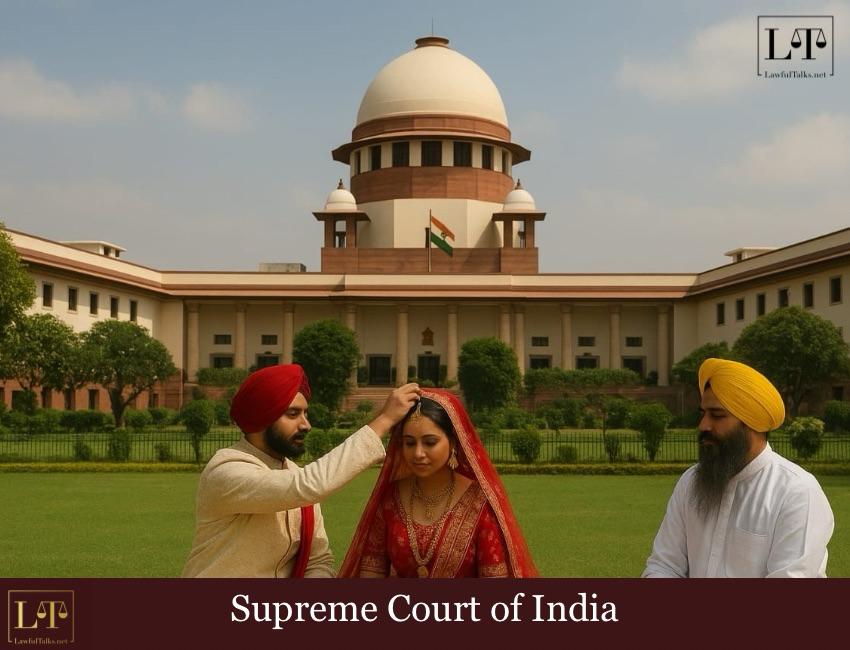Allahabad HC Sets Aside Afzal Ansari's Conviction, Allows Him to Continue as MP

In a landmark ruling, the Supreme Court of India has directed 17 States and 7 Union Territories (UTs) to frame rules under the Anand Marriage Act, 1909, for the registration of Sikh marriages (Anand Karaj) within four months. The Court noted that decades of non-implementation of the Act had created unequal treatment of Sikh citizens across India, thereby violating the principle of equality guaranteed by the Constitution.

Facts:
The matter reached the Court through a writ petition filed by Amanjot Singh Chadha, who highlighted the serious difficulties faced by Sikh couples due to the absence of uniform rules for registering Anand Karaj marriages.
While certain States had already framed the required provisions under Section 6 of the Anand Marriage Act, as amended in 2012, many others had failed to do so. This led to a discriminatory situation in which the ability of Sikh citizens to prove their marriage depended largely on where they lived.
A Bench comprising Justice Vikram Nath and Justice Sandeep Mehta observed that “In a secular republic, the State must not turn a citizen’s faith into either a privilege or a handicap. When the law recognises Anand Karaj as a valid form of marriage yet leaves no machinery to register it, the promise is only half kept. What remains is to ensure that the route from rites to record is open, uniform and fair”.
The petition made the Union of India, 17 States including Uttarakhand, Karnataka, Tamil Nadu, Jharkhand, Uttar Pradesh, Assam, West Bengal, Gujarat, Bihar, Maharashtra, Telangana, Nagaland, Sikkim, Tripura, Arunachal Pradesh, Goa, and Manipur, as well as seven Union Territories, parties to the case.
The court specified that Section 6 of the Anand Marriage Act, added in 2012, makes it a legal duty for every State and UT to set up a system to register Sikh Marriages performed through the Anand Karaj ceremony. The court rejected the view that States can choose whether to do this or wait until there is a large Sikh population.
The judges further clarified that a marriage is still valid even if it is not registered. However, a registered marriage certificate is very important to protect rights such as inheritance,succession, maintenance, insurance, and other spousal benefits especially to safeguard women and children.
“The Anand Marriage Act, 1909 (hereinafter, “The Act”) was enacted to recognise the validity of marriages performed by the Sikh ceremony of Anand Karaj. By the Amendment of 2012, the Parliament inserted Section 6 of the Act casting a duty upon the respective State Governments to make rules to facilitate registration of such marriages, to maintain a Marriage Register, and to provide certified extracts, while clarifying that omission to register would not affect the validity of an Anand marriage.” stated the court. To ensure effective implementation, the Court issued a series of time-bound directions.
1.It ordered all States and UTs that have not yet framed rules to do so within four months and to publish them in the Official Gazette. Until such rules are notified, marriages solemnised through Anand Karaj must be registered under the existing general marriage registration frameworks without discrimination.
2.“ Where requested, the marriage certificate must specifically mention the Anand Karaj rite. States that have already framed rules are required to issue clarificatory circulars within three months, publish details of forms and fees online, and ensure that no duplicate registration under other laws is demanded once the Anand Marriage Act registration Where the parties so request, the registering authority shall record in the certificate that the marriage was solemnised by the Anand Karaj rite’’
3. Respondents that have already notified rules under Section 6 of the Act shall continue to operate them. Within three months, they shall issue a clarificatory circular to all registering authorities and publish on the official portal the applicable forms, fees, documents required, and timelines, and shall ensure availability of certified extracts in terms of Section 6(2) of the Act.No authority shall insist on an additional or duplicative registration under any other law once registration under the Act is granted, in view of Section 6(5) of the Act.
4. Every respondent shall, within two months, designate a Secretary-level Nodal Officer to oversee compliance with this order, to issue any consequential administrative directions, and to address grievances regarding receipt and certification of Anand Karaj marriages
5. The Respondent no.1, Union of India, shall act as the coordinating authority. Within two months, it shall circulate model rules compiled from jurisdictions that have already notified Section 6 rules to any State or Union Territory that seeks guidance. Within sixmonths, it shall compile and present a consolidated status report before this Court indicating compliance by each respondent and place the same on the website of the Ministry of Law and Justice, in addition to furnishing a copy to the Registry.
6. Moreover, we make it clear that no application for registration of an Anand Karaj marriage or for a certified extract shall be refused on the sole ground that rules under Section 6 of the Act have not yet been notified. Any refusal shall be reasoned in writing and shall remain amenable to remedies in law.”
Case Status: AMANJOT SINGH CHADHA VERSUS UNION OF INDIA & ORS | WP(c) 911/2022

Pallavi Zende
Law Student
Latest Posts
Categories
- International News 19 Posts
- Supreme Court 390 Posts
- High Courts 383 Posts



















































































































































































































































































































































































































































































































































































































































































































































































































